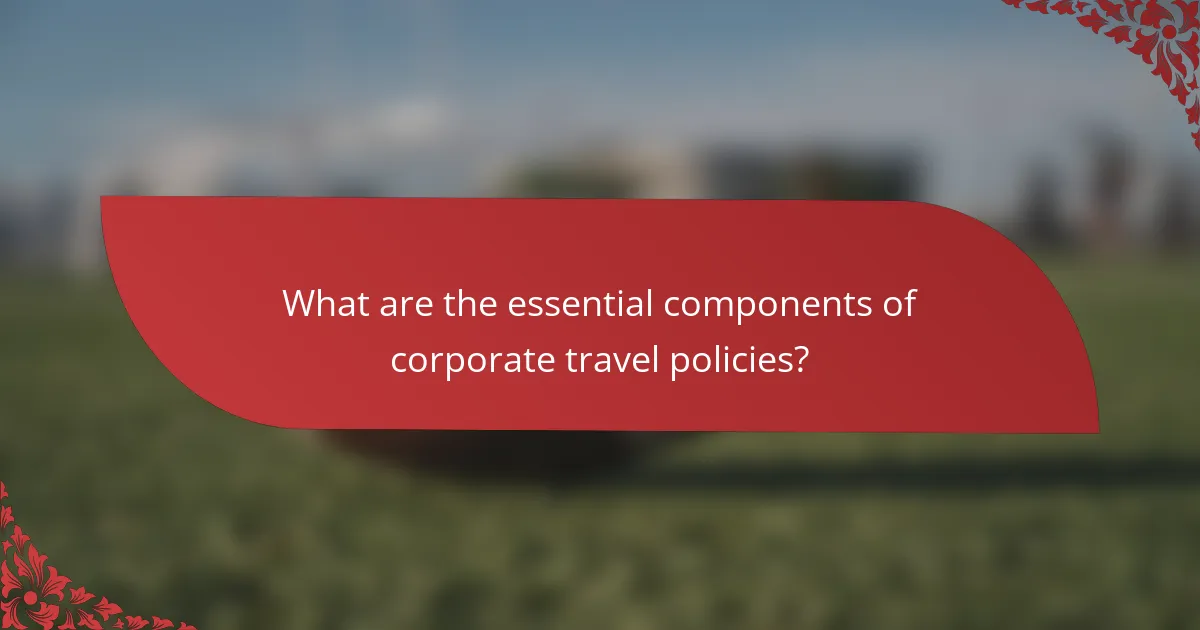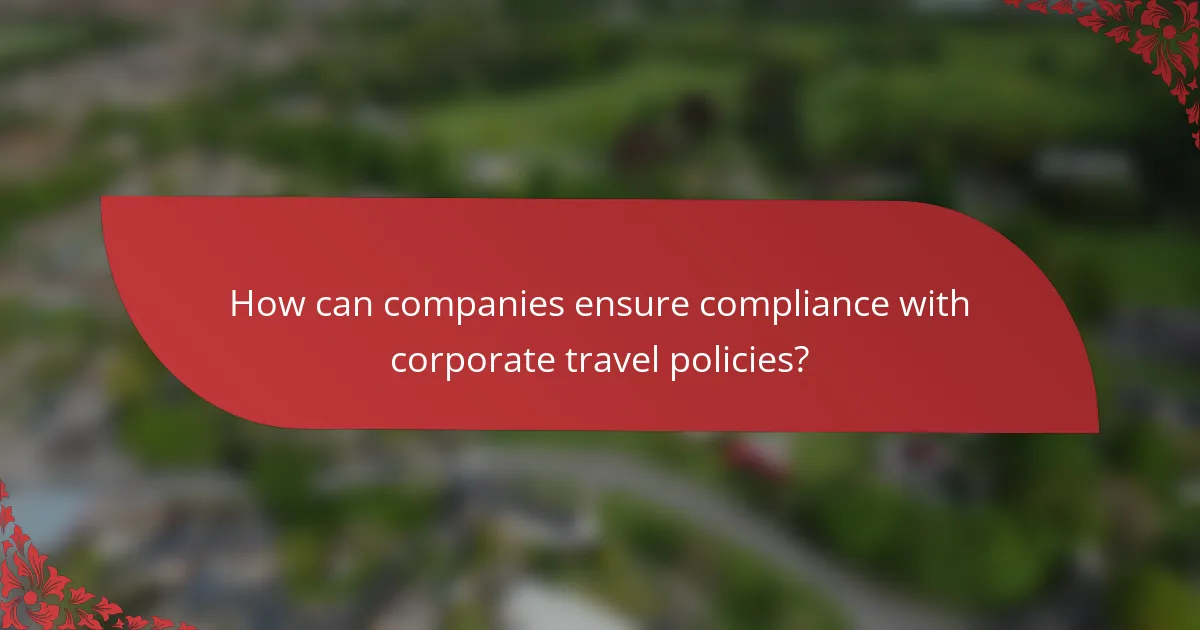Effective corporate travel policies enhance cost efficiency and employee safety while ensuring compliance with local regulations. This article explores essential components of travel policies, compliance strategies, and successful examples from companies in Lisbon. It highlights best practices, the role of technology in streamlining processes, and the importance of employee feedback for continuous improvement.

What are the essential components of corporate travel policies?
Essential components of corporate travel policies include clear guidelines on travel booking, expense management, safety protocols, and compliance with legal regulations. These policies ensure cost efficiency and employee safety while promoting organizational standards. Key elements often include travel approval processes, preferred vendors, and reimbursement procedures. Companies in Lisbon may emphasize local regulations, cultural considerations, and sustainability practices in their policies to align with regional business practices.
How do corporate travel policies enhance employee productivity?
Corporate travel policies enhance employee productivity by providing clear guidelines and reducing uncertainties. These policies streamline travel processes, ensuring employees can focus on their work rather than logistics.
Additionally, effective travel policies promote cost efficiency, allowing companies to allocate resources better. For example, standardized booking procedures can lead to better rates and reduced travel expenses.
Moreover, compliance with policies fosters a sense of security among employees, which can enhance their overall job satisfaction and motivation. This is particularly relevant in cities like Lisbon, where travel dynamics can vary significantly.
In summary, well-structured corporate travel policies not only improve efficiency but also contribute to a more engaged and productive workforce.
Which compliance regulations must corporate travel policies adhere to?
Corporate travel policies must adhere to various compliance regulations, including data protection laws, labor laws, and industry-specific regulations. These regulations ensure the protection of employee rights and the proper handling of sensitive information.
Key compliance areas include:
1. GDPR: Protects personal data of employees traveling within or to the EU.
2. OSHA: Ensures employee safety during travel.
3. IRS: Governs tax implications for business travel expenses.
4. Local labor laws: Vary by region, affecting work hours and compensation.
Adhering to these regulations helps organizations mitigate legal risks and foster a responsible travel culture.
What are the common pitfalls in corporate travel policy development?
Common pitfalls in corporate travel policy development include lack of stakeholder involvement, unclear guidelines, insufficient compliance measures, and failure to adapt to changing needs. Engaging key stakeholders ensures that policies reflect diverse perspectives. Clear guidelines prevent confusion and enhance adherence. Compliance measures, such as monitoring and reporting, are crucial for maintaining accountability. Lastly, regularly reviewing and updating policies keeps them relevant and effective.

How can companies ensure compliance with corporate travel policies?
Companies can ensure compliance with corporate travel policies by implementing clear guidelines and regular training. Establishing a centralized approval process helps maintain oversight.
Regular audits of travel expenses can identify discrepancies and reinforce adherence. Utilizing technology, such as travel management software, streamlines booking and tracking, ensuring policies are followed.
For example, setting a cap on daily meal allowances can control spending while promoting adherence to budgetary constraints. Engaging employees through feedback mechanisms fosters a culture of compliance and accountability.
What role does training play in policy compliance?
Training plays a crucial role in ensuring compliance with corporate travel policies. It equips employees with the knowledge and skills necessary to understand and adhere to these policies effectively. Well-structured training programs can improve awareness, reduce errors, and foster a culture of accountability. For example, regular workshops and online training modules can reinforce policy details, leading to higher compliance rates. Organizations that prioritize training often see a significant decrease in policy violations, enhancing overall travel management and cost efficiency.
How can technology facilitate compliance monitoring?
Technology enhances compliance monitoring in corporate travel policies by automating data collection and analysis. Tools like travel management software track employee travel behaviors, ensuring alignment with established guidelines. Real-time reporting features enable quick identification of non-compliance, fostering accountability. Additionally, mobile applications provide employees with instant access to policy updates, promoting adherence. Integrating AI can further personalize travel recommendations while maintaining compliance standards. Overall, technology streamlines processes, reduces manual oversight, and improves policy enforcement in Lisbon’s corporate travel landscape.
Which reporting mechanisms are effective for tracking compliance?
Effective reporting mechanisms for tracking compliance in corporate travel policies include automated expense management systems, regular audits, and employee feedback surveys. Automated systems streamline data collection, ensuring accuracy and timeliness. Regular audits provide insights into adherence levels, while feedback surveys gauge employee understanding and engagement with policies. These methods collectively enhance compliance monitoring and policy effectiveness.

What best practices should be followed when creating corporate travel policies?
To create effective corporate travel policies, follow these best practices: establish clear guidelines, ensure compliance with regulations, and incorporate employee feedback. Regularly review and update policies to reflect changes in travel regulations and company needs. For example, policies should address booking procedures, expense reporting, and safety protocols.
How can companies tailor policies to fit diverse employee needs?
Companies can tailor corporate travel policies by assessing employee needs, preferences, and compliance requirements. Customization enhances employee satisfaction and adherence to regulations.
1. Conduct surveys to gather employee feedback on travel preferences.
2. Analyze travel data to identify patterns and needs.
3. Create flexible policies that accommodate various travel styles and budgets.
4. Ensure compliance with local regulations and company standards.
5. Offer training sessions to inform employees about policy changes.
6. Regularly review and update policies based on employee feedback and changing regulations.
What are the benefits of including sustainability in travel policies?
Incorporating sustainability in travel policies enhances corporate responsibility, reduces costs, and improves employee satisfaction. Sustainable practices can lower carbon footprints, promote local economies, and align with consumer expectations. Companies adopting these policies often experience increased brand loyalty and a competitive edge. For example, integrating eco-friendly transportation options can lead to significant savings and positive environmental impact.

Which unique features distinguish corporate travel policies in Lisbon?
Corporate travel policies in Lisbon are distinguished by flexibility, local compliance, and cultural considerations. Companies often emphasize cost efficiency while accommodating employee preferences. Unique features include partnerships with local vendors and integration of sustainability practices. Additionally, policies may reflect Lisbon’s tourism dynamics, influencing travel options and accommodations.
How do local cultural norms influence corporate travel policies?
Local cultural norms significantly shape corporate travel policies by dictating acceptable practices and behaviors. In Lisbon, understanding local customs affects policies on meeting etiquette, dining, and work-life balance. For instance, punctuality may be viewed differently, influencing scheduling guidelines. Additionally, cultural preferences for communication styles can impact how companies structure their travel interactions. Adapting to these norms fosters better relationships and enhances compliance with local expectations, ultimately benefiting organizational effectiveness.
What specific local regulations impact travel policies in Lisbon?
Local regulations in Lisbon significantly influence corporate travel policies by mandating compliance with health, safety, and environmental standards. Key regulations include the requirement for travel insurance, adherence to local labor laws, and obligations regarding employee welfare. Companies must ensure that travel arrangements do not violate local transportation laws, including vehicle licensing and driver qualifications. Additionally, compliance with data protection regulations impacts how companies manage employee information during travel. Understanding these regulations is essential for maintaining operational integrity and avoiding penalties.

What are some examples of successful corporate travel policies in Lisbon?
Successful corporate travel policies in Lisbon prioritize cost efficiency, employee safety, and compliance with local regulations. Companies like Efacec and Galp Energia exemplify effective policies that streamline booking processes and ensure adherence to budget limits. Efacec emphasizes pre-approved travel guidelines, while Galp Energia integrates real-time expense tracking. These practices enhance accountability and improve overall travel experience. Additionally, local firms often leverage partnerships with travel agencies for better rates and services, showcasing a collaborative approach to corporate travel management.
What innovative approaches have companies taken in Lisbon?
Companies in Lisbon have adopted innovative approaches to corporate travel policies by integrating technology and sustainability. Many businesses utilize digital platforms for real-time travel management, enhancing compliance and employee satisfaction. Additionally, some companies emphasize eco-friendly travel options, promoting carbon offset programs and sustainable accommodations. These practices not only streamline travel processes but also align with corporate social responsibility goals.
Which industries in Lisbon are leading in corporate travel policy development?
The technology, finance, and tourism industries in Lisbon are leading in corporate travel policy development. These sectors prioritize effective travel management, compliance with regulations, and best practices to enhance employee experiences and optimize costs. The technology sector focuses on digital tools for travel booking and expense reporting. The finance industry emphasizes stringent compliance measures and risk management. Meanwhile, the tourism sector promotes sustainable travel practices and partnerships with local businesses.

How can companies optimize their corporate travel policies for better outcomes?
Companies can optimize corporate travel policies by aligning them with employee needs and organizational goals. Implementing flexible booking options enhances satisfaction and compliance. Regularly reviewing travel expenses and policies ensures they remain relevant and cost-effective.
Integrating technology, such as travel management software, streamlines processes and improves data tracking. Encouraging feedback from employees helps identify areas for improvement. For instance, companies in Lisbon have successfully adopted these practices, resulting in reduced travel costs and increased employee engagement.
What are the key metrics for evaluating the effectiveness of travel policies?
Key metrics for evaluating the effectiveness of travel policies include cost savings, compliance rates, traveler satisfaction, and policy adherence. These metrics help organizations assess the impact of their corporate travel policies in Lisbon.
| Metric | Description | Value |
|—————————-|————————————————–|—————————–|
| Cost Savings | Reduction in travel expenses compared to previous periods | 15% annual reduction |
| Compliance Rates | Percentage of travelers following policy guidelines | 85% compliance |
| Traveler Satisfaction | Average satisfaction score from traveler feedback | 4.5 out of 5 |
| Policy Adherence | Number of policy exceptions requested | 10 exceptions per quarter |
Which strategies can enhance employee satisfaction with travel policies?
Implementing transparent communication, offering flexibility, and incorporating employee feedback can significantly enhance satisfaction with corporate travel policies. These strategies foster a sense of ownership and trust among employees.
1. Transparent communication: Clearly outline travel policies and procedures to avoid confusion.
2. Offer flexibility: Allow employees to choose travel options that suit their preferences and schedules.
3. Incorporate feedback: Regularly gather employee insights to adjust policies based on their experiences and needs.
4. Provide support: Ensure dedicated resources are available to assist employees with travel-related inquiries.
These practices create a positive travel experience, leading to higher employee satisfaction.
What common mistakes should be avoided in policy implementation?
Common mistakes in policy implementation include lack of stakeholder engagement, insufficient training, unclear communication, and failure to monitor compliance. These errors can lead to inconsistent application and reduced effectiveness of corporate travel policies. Engaging employees and providing clear guidelines are essential for successful implementation. Regular reviews and updates ensure policies remain relevant and effective.
What expert tips can help in refining corporate travel policies?
To refine corporate travel policies, organizations should prioritize clarity, compliance, and employee feedback. Establish clear guidelines that address travel booking, expense reporting, and safety protocols. Regularly review policies to ensure alignment with legal requirements and industry standards. Engage employees in the policy development process to enhance adherence and satisfaction.




